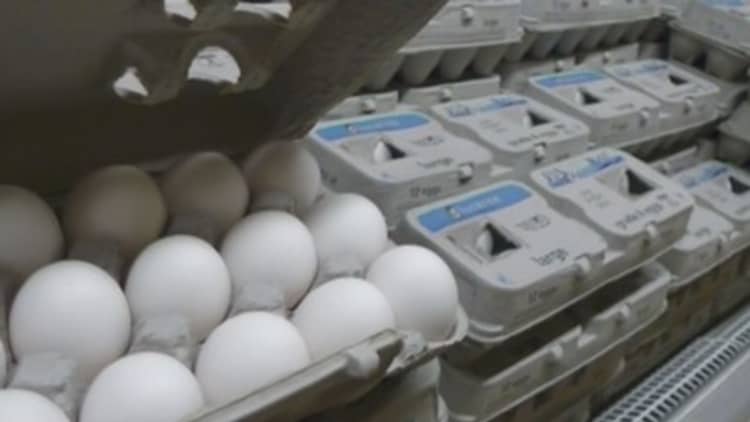
As restaurants double down on breakfast, their timing is far from eggscellent.
After the worst avian flu outbreak in three decades hit flocks this year, U.S. egg supply is lower than usual. As a result, prices at both the retail and wholesale level remain sharply elevated, and several restaurants are starting to feel the heat in the kitchen.
This coincides with a monthslong test at McDonald's of extending breakfast hours all day, part of the broader effort to turn around its U.S. business. There is strong evidence, too, that a nationwide launch could be on the way as soon as October, meaning its need for eggs could be about to increase.
"It's probably not going to be the best timing for McDonald's, unfortunately, but it's part of a longer-term strategy to focus on what's working and increase that," said Nick Setyan, equity analyst at Wedbush Securities, in a phone interview.
Meanwhile, Will Slabaugh, managing director of Stephens, said, "It would definitely pressure their cost of goods sold if they were to roll it out now. It would hurt them near term."
Read MoreMcDonald's all-day breakfast may debut nationwide by October
Fellow fast food brand Taco Bell is also more exposed to egg swings after it rolled out breakfast last year, though a company representative said it has not been hit by the price hike so far.
McDonald's did not respond to CNBC's request for comment.
While restaurants often lock in prices under contract, they do feel the pinch from higher commodity prices if they stay elevated for a prolonged period of time.
"Most are only going to contract three to six months because it's a volatile commodity, and you never want to get yourself locked into all of it," Slabaugh said.
As of Monday, Midwest wholesale prices have risen 135 percent to $2.80 per dozen, from $1.19 per dozen on April 22, according to prices from market research firm Urner Barry. Retail prices typically run even higher.
The problem could get worse if wild birds spread the flu this coming fall when they migrate south.
Read More $6 eggs could be on the way
Restaurants' exposure to avian flu impact is very case specific and depends on whether or not their suppliers have been directly impacted or not by the virus or not.
"Some major corporate chains have not seen an impact to their supply or price. Others have seen higher costs through regular suppliers. Others are completely exposed to the open market and are struggling to source full need," said Brian Moscogiuri, market reporter for eggs and egg prices at Urner Barry, in an email.
Several large chains have warned Wall Street they are already feeling an impact.
Due to tight supply, breakfast heavyweight Dunkin' Donuts withdrew a major promotion it planned for the current quarter.
Others have also had to shelve products, including Rita's frozen custard and Panda Express' hot and sour soup.
Meanwhile, Denny's expects the impact from pricing to get "more significant" in the second half of the year. The chain pegs the egg portion of its market basket at 10 percent, a fairly big chunk for the restaurant industry.
"[W]e think without the eggs, we would have had a fairly flattish commodity year, but we're guiding 2 percent to 2.5 percent," said John Miller, its president and CEO, on a Monday earnings call.
To counteract the egg price increase, some restaurants are passing costs off to customers.
Denny's boosted omelet pricing while Fiesta Restaurant Group's Taco Cabana temporarily raised prices on egg-based breakfast tacos and burritos until it was able to secure lower prices.
While restaurants are already starting to see some impact from higher prices, analysts say restaurants will see a larger effect starting the current quarter.
One positive is that eggs are typically featured in breakfast items, dishes that are already seeing strong demand. In fact, breakfast is the only time of day posting strong growth in visits, rising 4 percent for the year ended in May, according to data from The NPD Group.
"I don't expect it to hurt as badly because that pricing power is there," said Stephens' Slabaugh.


